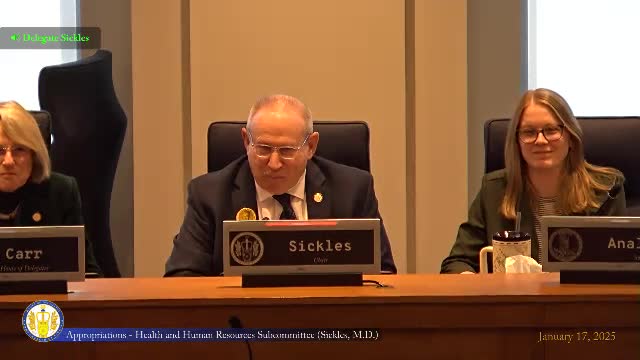Virginia proposal funds trained ‘special conservators of the peace’ to ease crisis holds and jail-to-hospital transfers
Get AI-powered insights, summaries, and transcripts
Subscribe
Summary
The Department of Behavioral Health and Developmental Services told the House subcommittee it seeks multi‑year funding to expand crisis services, launch specially trained custody officers (S‑COPS) and speed evaluations for forensic patients amid high hospital census and long custody waits.
Commissioner Nelson Smith, head of the Virginia Department of Behavioral Health and Developmental Services, told the House Appropriations Subcommittee on Health and Human Resources on Friday that the agency’s FY‑25 and FY‑26 budget requests include new spending to reduce criminalization of mental illness and shorten long custody waits.
Smith said the governor’s biennial package would add $53,500,000 in fiscal 2025 and $56,400,000 in fiscal 2026 to advance the administration’s Right Help Right Now plan, including a proposal to fund specially trained “special conservators of the peace,” or S‑COPS, who would maintain custody and support patients while they await inpatient beds. “People in crisis are still being criminalized for their mental illness. In many cases, as you know, they’re handcuffed to beds for many hours,” Smith said.
The nut of the proposal is to place trauma‑informed, crisis‑intervention trained S‑COPS in emergency settings and on transport so custody transfers do not rely solely on uniformed law enforcement. Smith told the committee a $35,200,000 item in the governor’s budget would let the state expand the S‑COPS model to regions 1, 2, 4 and 5 and support demonstration sites at selected private hospitals. “Unlike law enforcement, whose presence alone can unintentionally increase some of these individuals’ anxiety … these S‑COPS will not wear those uniforms,” Smith said.
Why it matters: Smith said the state hospital system remains full despite reopening beds and adding 56 new beds, and that forensic admissions and court‑ordered restorations to competency have driven census growth. “Since 2014, forensic patients in the state hospitals have increased by 93%,” he said. The department also flagged rising pharmacy costs — up roughly 164% over the past decade — and said long stays and a high forensic census increase per‑day costs to the Commonwealth.
Committee members asked for data to support the economic case for S‑COPS — specifically whether the program would save overtime or other local costs now incurred by police and sheriffs. Delegate Krizak requested cost comparisons; Smith said he has overtime reports from chiefs and would provide financial data to the committee. Delegate Koerner asked whether the S‑COPS role requires a law‑enforcement background; Smith said S‑COPS are sanctioned through courts via the criminal justice system and that the planned model adds crisis‑intervention (CIT) and trauma‑informed training, but he deferred specific hiring qualifications to follow up.
The commissioner described pilot work in Southwest Virginia using a private vendor and said early results show fewer dangerous “drop‑offs” at hospitals and that 78% of patients taken into custody by S‑COPS were subsequently placed in private beds. He also said the department is rewriting alternative‑transportation contracts and expects to award the contract within the month.
Other budget items Smith described include $1,500,000 for the Adult Psychiatric Access Line (APEL) to sustain two regional pilots and expand consultative support for primary care and emergency clinicians, $1,200,000 for crisis co‑responder programs pairing clinicians with specially trained officers, and a $1,400,000 non‑general fund allocation for problem‑gambling treatment drawn from gaming receipts. Smith also noted language amendments to allow DBHDS to set up contracts with private hospitals for demonstration sites.
Agency capacity and operations: Smith said the department has reduced licensing backlog times dramatically (from 18–24 months to roughly 30 days) and has driven down some vacancy rates from about 36% to the “teens,” though some hiring needs remain. The governor’s package would add evaluator positions at hospitals with the largest forensic populations, funding for service‑authorization staff to meet regulatory timeframes (the department reported 126,310 service‑authorization submissions in 2023), and information‑security staff after a cybersecurity exercise with Oracle Health.
What the subcommittee directed or requested: Delegates asked for the permanent injunction and related Department of Justice settlement documents; Smith said those have been sent and he would provide copies. Members also sought the pilot evaluation data for Southwest Virginia; Smith said the department would share the numbers. Several members emphasized the need for tracked data on whether the S‑COPS proposal reduces local overtime, forensic admissions, or other downstream costs.
Ending: Smith closed by saying the administration is pursuing a multi‑pronged approach — building crisis services, adding clinical capacity and testing custody alternatives — and invited follow up meetings with the subcommittee for additional details and documentation.
